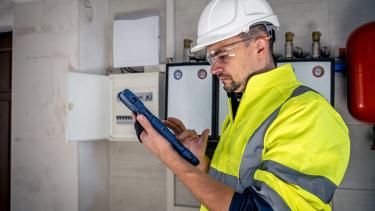
Optimizing Energy Use with Direct Digital Controls in Our Schools
Direct Digital Controls (DDC) automate the operation of building Mechanical systems like heating, cooling, water consumption, security/fire systems, and lighting based on present schedules and occupancy patterns. By adjusting settings according to occupancy and time of day, DDC systems ensure that energy is used only when necessary, reducing waste and optimizing energy consumption for maximum efficiency. The purpose of DDC is to help save energy through efficient scheduling.
In the early 2000's, only a fraction of our school district sites had DDC systems, and at those sites, often only a handful of larger pieces of HVAC equipment were controlled by DDC. As of 2024, the number of school district sites with modern DDC systems has increased substantially. Currently, about 96% of our sites have DDC systems, with most of these systems controlling nearly all of the HVAC equipment at that site.
Here are the key features and components of Direct Digital Controls:
- Sensors: These devices collect environmental data, such as temperature, humidity, pressure, and occupancy levels. The sensors convert physical measurements into digital signals that can be processed by the DDC system.
- Controllers: At the core of the DDC system, controllers receive digital signals from sensors and use pre-programmed algorithms to make decisions. These decisions dictate how the actuators should respond to maintain desired conditions. Controllers are essentially small computers with specific software designed to manage building systems.
- Actuators: These devices carry out the commands from the controllers. They adjust the operation of HVAC components, lighting systems, or other mechanical devices to meet the desired setpoints. Examples include opening or closing dampers, adjusting fan speeds, or dimming lights.
- Communication Network: DDC systems rely on robust communication networks to link sensors, controllers, actuators, and user interfaces.
DDC work requires various specialized skills, including Mechanical (HVAC), Electrical, Computer Programming, Motor Controls, Electronics, and Graphic Design. Our DDC Foreman, Jaret Wiebe, monitors all school district sites daily to ensure that each site is running efficiently and has the proper heating, cooling, and ventilation in place. Additionally, this department maintains all DDC computer programming and monitors and controls major boilers, circulation pumps, air handlers, rooftop units, heat pumps, A/C units, Chillers, Cooling Towers and more. All scheduling for HVAC equipment and exterior lighting at most school district sites is controlled through DDC. Remote troubleshooting is often used to determine problems as they arise and the appropriate team to respond to the issue. They also work alongside Mechanical Engineers, HVAC/DDC Contractors, and other trades for project work and repairs.
In summary, Direct Digital Controls represent a sophisticated and essential component of modern building automation, enhancing the efficiency, comfort, and sustainability of building operations.
AARON PORTMAN, MANAGER, MECHANICAL
Facilities